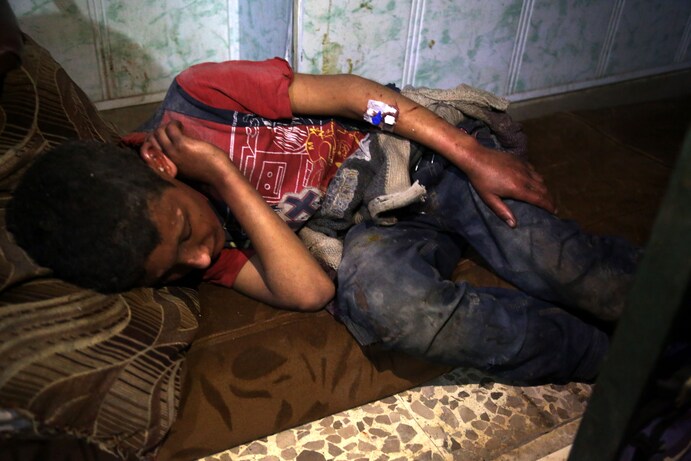BEIRUT — The day had begun much as any other over the past two months in the rebel-held town of Douma east of the Syrian capital, Damascus. Warplanes dropped bombs, families hid in basements, and ambulances raced through empty streets to rescue the injured.
But when gasping, trembling people, some of them foaming at the mouth, began streaming into one of the town’s few functioning clinics that evening, staff instantly knew something was different. The victims emitted a powerful smell of chlorine, but there were more people affected than in previous chlorine attacks, said Mohammed Marhoum, a medical worker. He saw around 70 and said six of them died.
They also seemed to be more severely affected than those he had treated after previous chlorine attacks, and they displayed symptoms he had never seen before. Some were twitching, others had abnormal pupils, and some were foaming at the mouth. Several arrived at the hospital unconscious.
He and the other medical workers began to suspect that whatever killed them may have been stronger than chlorine. “We believe the gas used was chlorine and another kind of gas,” he said.
At around midnight, the last two victims were brought in, a boy and a girl, both around 2 years old, both dead. “Their bodies were cold and stiff. Their mouths were foaming. They didn’t have any wounds. It was obvious that they had suffocated,” Marhoum said.
The international Organization for the Prohibition of Chemical Weapons, meanwhile, said it had accepted an invitation from the Syrian government and is preparing a team to travel to Syria “soon.”
Mohamad Katoub of the Syrian American Medical Society, which supported medical facilities in Douma before the Russians entered, said he doubted whether any meaningful evidence would remain. Local staffers are afraid to give testimony, he said. “In the current situation,” he said, an investigation “is too hard.”
Many of the activists, medical staffers and rescue workers with information about the attacks have since scattered, with many leaving Douma on buses headed north to rebel-held territory under the terms of the surrender deal reached Sunday between the rebels and the Russians. Among them was Marhoum, who spoke Tuesday from one of the buses.
“The Russians have entered, and there are no guarantees for us not to be killed or detained,” said a medical student who is hoping to leave soon and does not want to risk being arrested, and who spoke on the condition of anonymity. “We’re worried about being searched. We don’t know what the regime and the Russians are preparing for us.”
The White House said this year that it suspected the Syrian government was experimenting with new forms of weapons, but there has been no independent confirmation.
Article date




